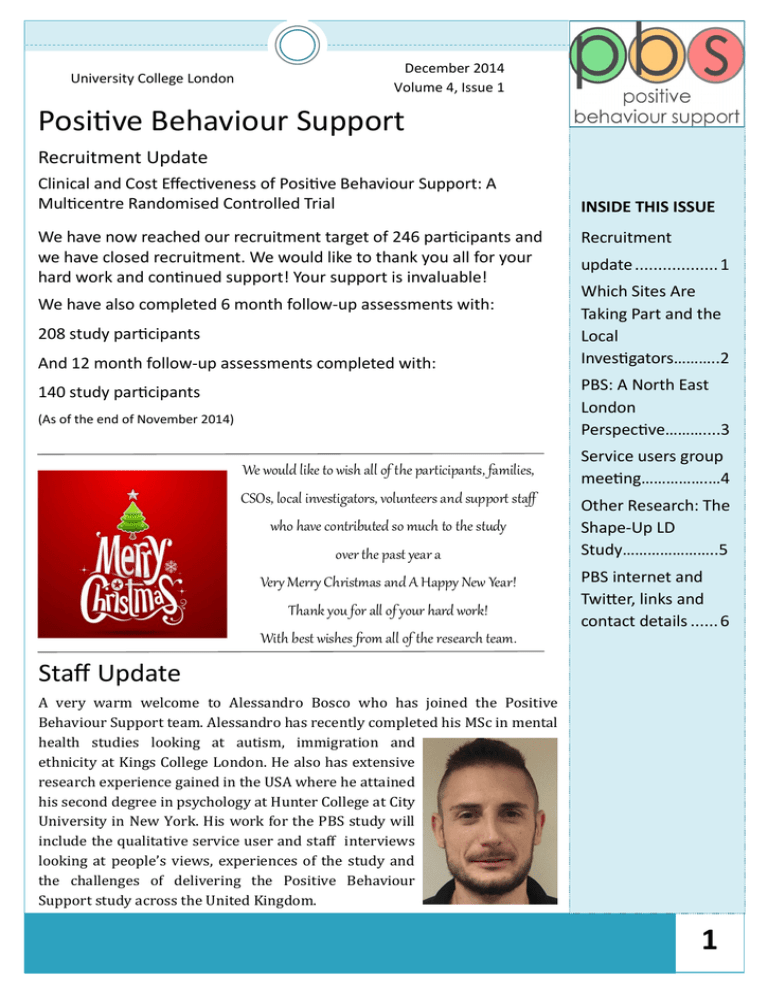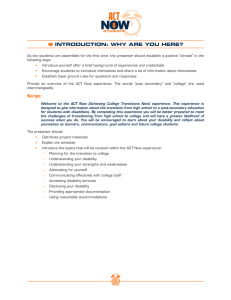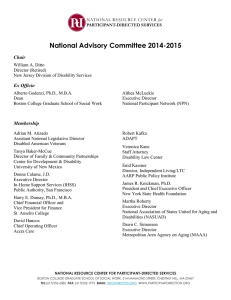Positive Behaviour Support Recruitment Update
advertisement

University College London December 2014 Volume 4, Issue 1 Positive Behaviour Support Recruitment Update Clinical and Cost Effectiveness of Positive Behaviour Support: A Multicentre Randomised Controlled Trial We have now reached our recruitment target of 246 participants and we have closed recruitment. We would like to thank you all for your hard work and continued support! Your support is invaluable! We have also completed 6 month follow-up assessments with: 208 study participants And 12 month follow-up assessments completed with: INSIDE THIS ISSUE Recruitment update .................. 1 Which Sites Are Taking Part and the Local Investigators………..2 PBS: A North East London Perspective………....3 140 study participants (As of the end of November 2014) We would like to wish all of the participants, families, CSOs, local investigators, volunteers and support staff who have contributed so much to the study over the past year a Very Merry Christmas and A Happy New Year! Thank you for all of your hard work! Service users group meeting…………….…4 Other Research: The Shape-Up LD Study…………………..5 PBS internet and Twitter, links and contact details ...... 6 With best wishes from all of the research team. Staff Update A very warm welcome to Alessandro Bosco who has joined the Positive Behaviour Support team. Alessandro has recently completed his MSc in mental health studies looking at autism, immigration and ethnicity at Kings College London. He also has extensive research experience gained in the USA where he attained his second degree in psychology at Hunter College at City University in New York. His work for the PBS study will include the qualitative service user and staff interviews looking at people’s views, experiences of the study and the challenges of delivering the Positive Behaviour Support study across the United Kingdom. 1 Which sites are taking part? The trial is being conducted across several regions in England, which cover urban, semi-urban and rural areas: Barnet Learning Disability Service Barking & Dagenham Learning Disability Service Havering Learning Disability Service Waltham Forest Learning Disability Team Bexley & Greenwich Learning Disability Services Bradford Learning Disabilities Service Camden Learning Disability Service Charnwood Community Learning Disability Team Coalville & Hinckley Community Learning Disability Team Leicester City (East) Community Learning Disability Team Leicester City (West) Community Learning Disability Team Market Harborough, Oadby & Wigston Community Learning Disability Team Coventry, South Warwickshire & Rugby Community Learning Disabilities Team Dartford, Gravesend & Swanley Mental Health of Learning Disability Service Medway Mental Health of Learning Disability Service East Surrey Community Team for People who have a Learning Disability Mid Surrey Community Team for People who have a Learning Disability South West Surrey, NE Hants & North West Surrey Community Team for People who have a Learning Disability Enfield Integrated Learning Disability Service Hackney Learning Disability Service Islington Learning Disability Partnership Tower Hamlets Community Learning Disability Service Wandsworth Community Learning Disability Services 2 PBS: A North East London perspective Hello all. We are Angeliki and Sheetal, CSOs based at North East London NHS Foundation Trust (NELFT). We have been working on PBS since the very beginning and cannot believe that the 12 month follow up stage has already begun for our final learning disability team. It seems not so long ago that we were rushing around frantically trying to gather names from teams, approaching them and following up with the initial baseline assessment! The study has been running over three sites in North East London: Havering, Barking & Dagenham, and Waltham Forest Learning Disability teams. As Imogen alluded to in the previous newsletter article, we observed that participants (particularly family carers) found the opportunity to reflect on their situation and their relationship with the person in their care, a positive experience. Some reported it as being useful to speak to someone when perhaps there is no clinical input from other teams. Our Success It is important to acknowledge the invaluable enthusiasm that our Principal Investigator, Dr Bini Thomas has provided. She has been approachable and proactive in supporting this study and this certainly reflected in our rapid recruitment rate. Many other team members found the prospect of positive behaviour support training an inspiring incentive to become involved. They believed that the psychological intervention may serve as a useful additional clinical tool in their practice. Early on, the leads for each team identified a list of potential participants who they had also engaged before we contacted them. This helped when informing people about the aims of the project and I am pleased to say that we have only had 4 out of 93 people drop out since recruitment into the study. That’s not to say we haven’t had our fair share of difficulties! The biggest difficulty indeed was when the learning disability team had not made initial contact with the identified service users and carers. We found this unhelpful and a strong barrier to recruiting confused residential homes and carers. Another challenge came when very eager team leaders had unblinded us! We then had to pass on some extra work to the poor study team, sorry! The PBS team have been open and understanding of our difficulties and have tried their best to iron out any issues we encountered. It has been a pleasure working with them and it is hard to believe that we are nearing the end of our PBS journey. We hope that PBS is running smoothly in other Trusts too and that we yield some important findings. Authors: Angeliki Kassari, and Sheetal Dandgey Clinical Studies Officers for PBS in North East London. 3 Service Users Group Meeting There was a service users’ group meeting in October where the group’s future involvement in disseminating the trial findings was discussed. In addition the study’s research assistants, Victoria Ratti and Jessica Blickwedel, briefly presented their respective proposed PhD and MSc projects. Key feedback included: The group are happy with how the study is progressing and commented positively on the number of participants seen to date. The three group members present would all like to be involved in writing about the project and one member already has experience in writing up research results for a different study. The group also offered to help ensure that appropriate photo symbols will be used. They would like to get involved with presenting the study at conferences. They would also like to help plan a day for people with LD to talk about the study, e.g. by holding small groups and preparing materials. The Service User Group Jide Akinbiyi Michaela Musa Sandy Smith Author: Jessica Blickwedel 4 The Shape-Up LD Study: Piloting a manualised weight management programme for overweight and obese persons with mild-moderate learning disabilities in an NHS Learning Disability Service Shape Up-LD is a group based self-help weight management programme for adults with Learning Disabilities, and their carers where appropriate. The groups, led by two facilitators, run for 12 weeks and cover various topics including food groups, portion sizes and physical activity as well as promoting self-monitoring and goal setting. Our pilot study aimed to answer the question ‘Can we design a feasible, large scale, randomised controlled trial that will answer the following question: 'Is Shape Up-LD more effective than usual care in helping overweight and obese service users with mild-moderate LD reduce body weight?'. We recruited 50 participants, mostly from Camden and Islington LD Services and randomised them to participate in the Shape Up-LD Programme or to receive ‘usual care’. Participants were followed up at 3 and 6 months. At Baseline and follow-up assessments participants were weighed and measured, had their blood pressure taken and answered a number of questionnaires. In this pilot study we were interested in the recruitment rate, how the participants found the assessments and how they felt about the groups, as well as weight change. We found that at 3-months the intervention group were 0.3kg lighter than the control group, after controlling for baseline weight (the 95% confidence interval was -2.4kg to +1.7kg). We found that we were able to recruit participants to the study and we had positive feedback about the intervention from facilitators, carers and participants. We are continuing with our analyses to look at the results in more detail. If you would like any more information about the study please contact Dr Phillippa Lally at: p.lally@ucl.ac.uk Author: Dr Pippa Lally, Research Psychologist 5 The PBS website: www.ucl.ac.uk/positive-behaviour-support Twitter account: www.twitter.com/PBSstudy University College London Division of Psychiatry Charles Bell House 67-73 Riding House St. London W1W 7EY Phone: 020 7679 9311 a.hassiotis@ucl.ac.uk m.poppe@ucl.ac.uk v.ratti.11@ucl.ac.uk j.blickwedel@ucl.ac.uk christopher.anderson@ucl.ac.uk 6





